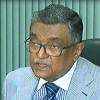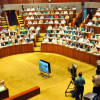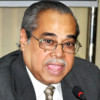Reform local govt system
A commission needs to be formed to review and reform the local government system, which was now being run in an “ambiguous” way, and its electoral system should also be amended, speakers at a conference said yesterday.
They said the partisan election system to the union parishad (UP) had made local leaders more accountable to political high-ups than the masses they serve and recommended setting-up of courts at upazila levels to immediately resolve relevant issues.
The observations were made at a symposium titled “LG: Reflections on Agenda for reform”, organised by the Bangladesh Institute of Law and International Affairs (BILIA) at its office in the capital.
The conference was presided over by former advisor to a caretaker government Dr Hossain Zillur Rahman. There were two keynote speakers -- Tafail Ahmed, vice-chancellor of Britannia University, Cumilla and Salauddin M Aminuzzaman, a professor of Dhaka University's public administration department.
Tafail, in his presentation, pointed out the flaws in Bangladesh's local government (LG) system compared to those in other countries, including India, Switzerland and South Korea.
“The LGs are working as the agency of the government [here], not as a real government... the system is running in an 'ambiguous situation'.”
“There are 502 functions of a Deputy Commissioner (DC)! Is it humanly possible to do these jobs? ... DCs have 31 functions in LGs [alone]. So where is the chance for others to work?” he said, bringing up the overlapping and numerous functions of different designations in field administration and LGs.
“Could you imagine a thana [police station] holding a 'court' at night?,” Tafail said, describing the illegal powers exercised by different police stations in Chattogram.
There are 110 functions of a zila parishad, 31 functions of an upazila parishad, 248 functions of a city corporation, and 172 functions of a municipality; these are not implementable due to the sheer number of duties, he said.
Tafail recommended that a commission be formed for reformation of the LG.
He placed a 10-point recommendation for the reformation of the LG system in Bangladesh, including a local government framework law, reorganisation of field administration, electoral reform in LGs, new parliamentary organisation for LGs, ensure functional assignment and expenditure assignment, capacity development for local governance and integration of national and local plans.
Addressing the conference, Zillur Rahman said increasing direct funding to the upazila parishad level was a prerequisite to any reform. He pointed out the 31 percent decrease in budget for LGs between 2013-14 and 2016-17, adding that one third of the budget was being spent by different central organisations of the government.
He also highlighted the need for empowering LGs in order to meet the sustainable development goals.
Speakers also pointed that the elections to different bodies, from national to local bodies, was a reason for continuous political violence.
Zillur said symbol-based partisan election system had hampered the leadership process in LGs and resulted in a concerning lack of accountability in the root level.
“Now we hear about hybrid leaders; It means leadership without any history of accountability, [which was] gained in an unauthorised way either by using money or connections. In this case, LGs have an important role [to bring about a solution].”
Afterwards, Salauddin M Aminuzzaman said, “The election system should be reformed. It could be as like as India—election to all bodies at a time.”
He explained how the LGs in foreign countries function effectively as they have authority to take decisions, are given wider space of autonomy and functional scopes.
The conflict between the members of parliament and other representatives of LG, including upazila chairman, has made the situation worse, he added.
“There is no need to go for further promise; rather just implementation of the pronounced intervention packages in vision 2021, a decentralised local government system, is enough to overcome the current stalemate.”
He also stressed on reviving the LG Commission, inter-government fiscal transfer policy, integrated LG act and revisiting the role and space of engagement of MPs in LG affairs.

 For all latest news, follow The Daily Star's Google News channel.
For all latest news, follow The Daily Star's Google News channel. 







Comments